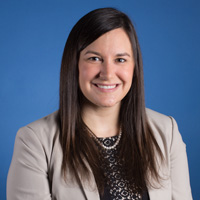
Fabiola Currarino
Executive Director,
Rice MBA Career Management Center
Fabiola Currarino joined the Jones Graduate School of Business as the executive director of the Career Management Center in December of 2012. Most recently, she served as associate director in the Career Development Office at MIT’s Sloan School of Management, where she contributed to its success with professional development for full-time MBA students. Prior to working at MIT, Fabiola was the European managing director for Minrad (now Piramal Healthcare). A native of Peru, she earned an MBA from the Harvard Business School and a B.B.A. from Pontificia Universidad Catolica in Lima, Peru.
With the increased economic activity in Houston, has the CMC seen an increased demand for MBAs in Houston?
In general our students tend to stay within the Houston area, so it is a very important market for us. And, yes, the increased activity within the city’s economic environment absolutely has a positive effect on our students. We’ve seen that increased activity in multiple ways. On-campus recruiting opportunities, for example, where more companies from the Houston area come in and hire through our structured process. Also students are going out and doing their own networking, looking for their own specific opportunities. They are finding companies that haven’t hired MBAs in the past but are starting to understand the value of the MBAs and the Rice MBAs in particular and hiring them.
What are the industries hiring Rice MBAs?
The top industries hiring our MBAs are consulting, financial services, petroleum and energy, and technology. Consulting has remained around 20 percent in the past few years; financial services and energy have fluctuated in the past, accounting for 20 percent and 30 percent respectively last year. Technology seems to be coming back stronger; after the financial crisis there was a dip in that number, but we had a big number in internship recruiting for the class of 2014. Companies like Hewlett-Packard hired six interns this past summer, for us that’s a large number.
What things have you improved or added since joining the Jones School last December?
There are a number of initiatives that we’ve seen as areas of opportunity for the CMC since I joined.
- Health Care Fellowship Because health care has not been a sector that has traditionally hired MBAs, hospitals may not know the value a Rice MBA can bring to the table. In order to help students gain experience in health care, we provided summer fellowships so students could take those internships without worrying about salary. Once they demonstrate their value, the hospitals will realize the benefit and, in the long term, secure their own funds to bring more people in and hire our MBAs. We granted four fellowships this past summer to first year, full-time MBA students.
- Super Info Sessions We have had more companies interested in coming to campus to do an information session than dates available So we tried something called a super info session with six non-competing companies coming in to a one-hour session. They make their pitch to the students in 10 minutes, say who they are, who their team is, what their projects are, and what they’re looking for. The value for the companies is that they saw 60+ students versus the 5 to 10 they would have seen individually. The value for the students is that they heard from companies they might not have signed up to see. It was so well-received by the company representatives and the students that we plan to continue this in the spring semester.
- Intake Sessions In the past, it has been the students’ responsibility to come to us and discuss what their needs are for their two years. By implementing intake sessions, we ask students to come at least once and have a one-on-one conversation with an advisor to talk about predetermined topics. We ask them about their preferences, and where they are in their career efforts so that we understand as a whole what the class needs are. How do they look? What are the new trends, not only for the full-time students but also the professionals and executives? The data is very important and powerful for us. The students make a connection to the career center early on and start the process of defining what they want. From our side, we’re getting to know them better and getting hard data, which will allow us to tailor programs, customize our outreach to companies, and better understand what the students are interested in.
- The career center has always participated in diversity conferences. As previous lead academic partner for the National Association of Women MBAs (NAWMBA) and National Society of Hispanic MBAs (NSHMBA), the Jones School prides itself on its role of supporting its students and other MBA candidates who attend corporate recruitment events. We made the decision this year to become the first academic sponsor of National Black MBA Association (NBMBAA). Supporting the organization, the students, and companies that all come together – this year in Houston – was a significant opportunity for us.
Which alumni services does the CMC provide that alumni might not be aware of?
As an office we are now formally charged with services for alumni. What we currently provide is the job board — MBA focus — with employment opportunities for experienced hires across the U.S. We also have a dedicated advisor for the alumni, Marie Bergeron. So they can set up an appointment with Marie and sit with her one-on-one and discuss an array of questions such as, “I’m negotiating a job offer, how do I go about it?” Or “I’m considering moving from my current role into something else” or “I’m happy with my company but I want to move forward.” We are here, and we are happy to talk with alumni about their careers. That’s part of the investment they made as students and a service they will continue to have access to after graduation.
Also, we’re planning on doing a series of webinars in the near future (next academic year), with relevant content for alumni in different stages of their careers and in different industries.
How does the Jones School fare in terms of employment compared to other schools?
For the class of 2013 the rankings haven’t been published yet, so we don’t have exact data, but anecdotally through talking to different career centers there has been an overall uptick across the U.S. Most of the business schools are doing better. Having said that, our 79 percent offers accepted at graduation seems to be on the high end of the range, as well as our 94 percent three months out. So it seems to be a strong year for us not only compared to other schools, but relative to our own historic performance.
The JGSB Career Management Center has 11 full time staff committed to furthering the career goals and employment opportunities of new MBAs and alumni. For more information about the CMC visit www.business.rice.edu/CMC.
|














